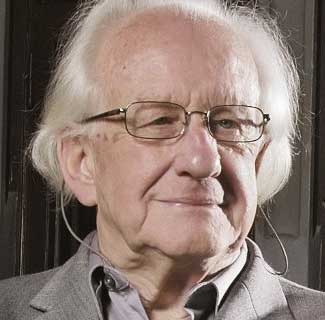By Kelly Rae Kraemer, Peace Voice, February 20, 2024
Our world lost a giant of peace research last weekend. Johan Galtung, “the Father of Peace Studies,” author of more than 100 books and 1,000 scholarly articles about world peace, passed away on February 17, 2024, at age 93.
Galtung taught at 30 universities on five different continents over the course of his seven-decade career, while serving as an expert adviser on more than 150 active conflicts around the world. His passing marks the end of an era for the academic field of peace research as well as for the practice of peacebuilding work in our world.
In 1969, dissatisfied with the popular idea of peace as a “negative,” the mere absence of war, Galtung redefined peace as the opposite of violence. He characterized the latter as “avoidable insults to life.” The art of peace became the skilled avoidance of such insults. In this way, he enriched our vocabulary of peace by embracing the notion of “positive peace,” also known as the presence of justice.
These terms had been used before by activists like Jane Addams and Martin Luther King; Galtung brought their language into academic discourse. This innovation allowed him—controversially—to identify destructive forces like poverty and racism as forms of “structural violence,” the exploitation and repression that form the roots of physical violence in our world. In this way, peace research expanded from the limited study of alternatives to war to the study of violence as an issue of social justice, enabling scholars to study the deep-seated roots of conflict.
In this way Galtung took our field of study beyond the Euro-American focus on peace as military security. He thought peace should be studied the same way as medicine, by diagnosing a problem, figuring out the prognosis, and, if it’s negative, designing therapies, or “peace work,” to produce more desirable outcomes. He trained students and colleagues around the world in this approach.
As a graduate student at the University of Hawai’i in the 1990s, I studied under Johan and worked as his research assistant. Today I can use Galtung’s D-P-T method to examine the on-going Middle East carnage with fresh eyes. Diagnosis: both the Israeli and Palestinian peoples fear extinction at the hands of the other. If the conflict follows its current militarized trajectory, it’s likely to escalate unless or until one or the other group is annihilated. Prognosis: genocide.
The question for peace advocates becomes one of using the diagnosis to help us identify alternatives–the T, or treatment–to the current violence. One possibility might be “A Land for All,” a proposed solution involving two independent nations sharing one homeland, allowing Israelis and Palestinians to live both together and apart. It’s the peacemaker’s job to generate such options for conflict transformation.
Galtung was Norwegian. It is telling that when Norway, and other countries as well, came under some terrible conflict, they turned to him for guidance. Few are aware in America that, for instance, Denmark appealed to him to fix the deadly conflict when a Danish cartoonist depicted the Prophet Mohammad as a terrorist and Danish embassies around the world were being firebombed, they asked Galtung to help.
He set up a mediation session and disappeared from view with three influential imams and three representatives from the Danish government. The firebombings spread. Three days later he and the others emerged with an agreement. All violence stopped. This is the power of the advanced conflict worker. Galtung showed the way, this time and others.
In my land, America, when conflict threatens, it is the generals to whom the media and officials turn for guidance. Thus, it’s hardly surprising we fail to do anything except shed blood instead of gain justice and peace.
As his former student, I came to rely on Johan’s writing in the popular press for clear guidance on peaceful approaches to the most complex international conflicts. I didn’t agree with him on everything, but he taught me how to think about peace in a world where most people don’t.
I never followed his recommendation that every peace scholar should have two doctoral degrees in different subjects. Who could afford that these days–unless you live in one of those countries where all education is free?
For nonviolent alternatives to war and injustice, Johan Galtung was always one of my go-to sources. I’ll miss his voice and his unique brand of genius. And I hope his passing will bring his ideas to the attention of people around the world who hunger for peace.
He taught so many of us, and we are teaching others. When Gandhi was assassinated, British luminary Philip Noel-Baker remarked, “His greatest achievements are yet to come.” So it is with the transformative educator, Johan Galtung, gone but yet inspiring.
Kelly Rae Kraemer, Ph.D., is Professor of Peace Studies at the College of St. Benedict and St. John’s University in central Minnesota.













One Response
The Peace academic community lost its
founder Johan Vincent Galtung on the 17 th this month of February 2024.
He raised the subject about Peace Studies and founded the Peace Research Institute. The studies and mission that guided Him in life will continue to be developed by the community He built.